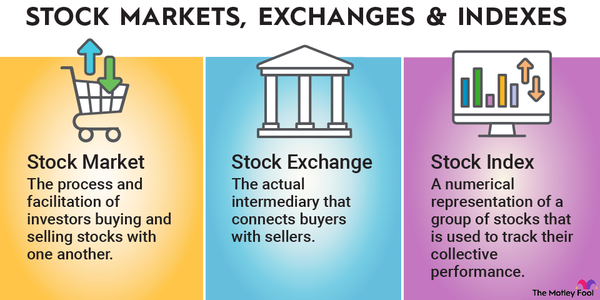There are thousands of publicly traded companies you can invest in, not to mention the many exchange-traded funds (ETFs) and mutual funds you can buy. So, it's not surprising that many investors don't know where to begin. Even with a market that reached record highs in mid-2025, plenty of stocks remain extremely attractive for long-term investors to consider buying.

But what are the best stocks to buy in July 2025? Although I can't consult a crystal ball that tells me what stocks will deliver the best returns, I've tried to do the next best thing. In this article, I'll discuss 10 stocks that I think could be great buys for long-term investors looking to put their money to work.
Why these 10?
Why these 10?
Before we get to the stocks, let's acknowledge three caveats:
- Choosing the best stocks to buy today depends on your personal financial situation. To get a feel for where you stand, read our guide on how to invest in stocks. It walks you through topics such as establishing an emergency fund, allocating assets, and choosing the right stocks for you.
- I like these stocks as long-term investments, even if a market crash or bear market arrives. I have absolutely no idea what they'll do over the next few weeks or months. In fact, if inflation unexpectedly spikes higher, trade tensions escalate, or the U.S. falls into a deep recession, it's entirely possible that most or all of them could soon decline.
- Although I ensured some variety, the list below isn't meant to be a fully diversified portfolio. Instead, these are my highest-conviction long-term stocks to invest in now. The best one-step way to diversify your holdings is to build the core of your portfolio around something like the Vanguard Total World Stock Index Fund ETF (VT -0.47%) or the Vanguard S&P 500 ETF (VOO -0.34%).
Now, let's get to my list of the 10 best stocks to buy and hold for the long term -- listed from smallest market cap to largest as of July 2025 -- followed by the summarized buy thesis for each.
Publicly Traded Company
| Name and ticker | Current price | Market cap | Industry |
|---|---|---|---|
| PayPal (NASDAQ:PYPL) | $73.06 | $71 billion | Diversified Financial Services |
| Airbnb (NASDAQ:ABNB) | $136.54 | $84 billion | Hotels, Restaurants and Leisure |
| MercadoLibre (NASDAQ:MELI) | $2,389.43 | $121 billion | Multiline Retail |
| CrowdStrike (NASDAQ:CRWD) | $473.84 | $118 billion | Software |
| Shopify (NASDAQ:SHOP) | $115.00 | $149 billion | IT Services |
| Intuitive Surgical (NASDAQ:ISRG) | $512.09 | $184 billion | Healthcare Equipment and Supplies |
| Walt Disney (NYSE:DIS) | $118.90 | $214 billion | Entertainment |
| Berkshire Hathaway (NYSE:BRK.B) | $470.16 | $1.0 trillion | Diversified Financial Services |
| Alphabet (NASDAQ:GOOGL) | $182.19 | $2.2 trillion | Interactive Media and Services |
| Amazon (NASDAQ:AMZN) | $226.54 | $2.4 trillion | Multiline Retail |
Stock pitches
Pitches for each stock
Now that you've seen my top 10 best stocks to buy now, you may be wondering why I picked each company. Here's a quick rundown of why I'm such a fan of each as a long-term stock to invest in.
Companies 1-3
1. PayPal
PayPal is an absolute cash machine that has been beaten down by more than 75% from its highs. If you aren't familiar with the recent history, PayPal completely overhauled its management team in late 2023. Every member of its C-suite is new to the business, and it is an impressive group.
The new leaders are already making some big moves, including rolling out an industry-leading cash-back debit card product and launching an advertising platform. Since the new leadership took over, efficiency has improved dramatically, and earnings per share (EPS) is significantly higher.
This could be just a starting point. Management has recently presented investors with a growth roadmap and believes it can achieve sustainable 20% annual earnings growth in the not-too-distant future.
Currently, the company has 436 million active users across PayPal and Venmo, and it processes about $1.7 trillion in annualized payment volume. The company produces about $6 billion in free cash flow annually and has been using it to aggressively buy back its own stock, a sign that management thinks it's cheap.
It's not hard to see why PayPal's management is choosing to use its capital this way. As of June 2025, the stock traded at a historically low price-to-sales ratio and for just 15 times forward earnings.
2. Airbnb
Few companies have been as successful in disrupting an entire industry as Airbnb. The company started in 2007 as a few air mattresses on the floor of the co-founders' apartments (that's where the company gets its name) and has evolved to the point where it has changed the way millions of people look at travel accommodations.
Airbnb has more than 5 million hosts who list more than 8 million properties and experiences on its platform. In the most recent quarter alone, more than 143 million nights and experiences were booked on Airbnb's platform, with a total booking value of almost $25 billion, which represents 9% year-over-year growth.
Airbnb is not only massive and growing quickly but also highly profitable. It generated $4.4 billion in free cash flow (FCF) and has a 39% FCF margin over the past four quarters.
Looking forward, Airbnb has $11.5 billion in cash and short-term investments on its balance sheet. And it still has a massive growth opportunity.
Its overall market opportunity is estimated to be trillions of dollars when including short-term stays, long-term stays, and experiences. Plus, management clearly believes the stock's valuation doesn't accurately reflect the long-term opportunity, given that the company has been buying back shares rather aggressively.
3. CrowdStrike
It seems like every week, there's another high-profile security breach. The need for cybersecurity solutions certainly isn't getting any smaller. And that's especially true when it comes to cloud-based security.
CrowdStrike is leading the charge to keep data secure in the cloud. This is a best-in-breed cybersecurity company with a highly effective platform.
CrowdStrike collects security data from each of its many users, analyzes it, and uses it to automate security throughout its entire network. This makes the platform highly effective at detecting the newest threats.
And the more users adopt CrowdStrike's solutions (known as its Falcon platform), the more effective it becomes. The use of crowdsourced threat data, combined with its leading market share, gives it a competitive advantage over peers.
With $4.4 billion in annual recurring revenue and an 80% subscription gross margin, CrowdStrike's growth has been impressive, but this could be just the beginning. The company sees its current addressable market at $100 billion in potential revenue and expects that the opportunity could more than double to $225 billion by 2028.
Companies 4-6
4. MercadoLibre
One of my favorite long-term stock investments in the market, MercadoLibre, is often referred to as the Amazon of Latin America, and for good reason. The company operates an e-commerce marketplace with a dominant presence in some of the region's most populous nations, including Brazil and Argentina.
However, there's a lot more to MercadoLibre. It operates a fast-growing payments platform called Mercado Pago, a logistics service known as Mercado Envios, a business lending platform, and more.
The marketplace saw $13.3 billion in merchandise volume in the first quarter of 2025, representing a 17% increase over the same quarter in 2024. Mercado Pago processes more than $230 billion in annualized payment volume, with three-quarters of this volume coming from outside the company's e-commerce platform.
E-commerce
Both main parts of the business are growing rapidly. And don't overlook Mercado Crédito, the company's young but fast-growing (and highly profitable) lending business. Mercado Crédito has $7.8 billion in outstanding loan balances.
MercadoLibre isn't just the Amazon of Latin America -- it's the Amazon, PayPal, Block (XYZ -3.89%) (owner of Square and Cash App), Shopify, and more, all rolled into one. And it's in a much earlier stage of growth. As the e-commerce and fintech landscapes in Latin America evolve over the coming years, MercadoLibre could be a major long-term beneficiary.
5. Shopify
Shopify operates a platform designed to enable businesses of all sizes to sell their products online, with a particular focus on empowering smaller businesses and growing with them by establishing long-term relationships.
Shopify offers a subscription plan starting at $39 per month for businesses (even less for one-person merchants). It also provides many adjacent services that help businesses operate smoothly, such as payment processing solutions and logistics.
Shopify's one-stop shop approach to enabling e-commerce has turned it into a powerhouse. It now has more e-commerce sales flowing through its ecosystem than any company besides Amazon. However, Shopify could be just getting started.
The platform has generated $9.4 billion in revenue over the past four quarters. However, this is just a fraction of its estimated $153 billion (and growing) market opportunity as more retailers shift their focus to online sales.
E-commerce is still in the relatively early stages, making up slightly more than 16% of retail sales in the United States. Shopify's platform has the No. 2 share of e-commerce by total payment volume (second only to Amazon), giving it a powerful ecosystem with network effect advantages over competitors.
The stock price remains well below its highs in the recent market downturn due to fears about recession and signs of a slowdown in consumer spending. And Shopify appears to be a great long-term opportunity.
6. Intuitive Surgical
Robot-assisted surgery beats shaky human hands. That general thesis hasn't changed much from when I first noticed Intuitive Surgical stock in 2005. The da Vinci Surgical System is the clear market leader, and its "razor and blades" model helps Intuitive generate a recurring stream of revenue.
Intuitive Surgical is dominant in its space, with a global market share of about 80%. It has lots of room to grow as the adoption of its surgical systems and the number of supported procedures increase over time. This is particularly true in many international markets, where the implementation of robot-assisted surgery could be a long-tailed growth catalyst for this excellent business for decades to come.
Companies 7-10
7. Walt Disney
The House of Mouse is like the all-weather tires of a portfolio. The pandemic hurt its theme park and movie businesses but helped the Disney+ streaming service, which has grown into a powerhouse years earlier than Disney expected.
In fact, barely five years after launching, Disney+ Core now has 126 million paid subscribers, while Hulu adds tens of millions more. In addition, the market is absorbing price increases with minimal impact on subscriber count, and Disney's streaming business has recently become profitable for the first time ever.
While consumers are clearly feeling the pressure of inflation, demand for Disney's theme parks, movies, and cruise line has been strong. In fact, per-guest revenue in Disney's parks is far greater than in comparable pre-COVID-19 pandemic times, thanks to initiatives that have driven higher in-park spending. Plus, the company is investing $60 billion over a decade in its theme parks and cruise line to ensure they remain full for the foreseeable future.
With Disney also laser-focused on the profitability of Disney+ and its other streaming platforms, Hulu and ESPN+, this could be a powerful combination of profitable, all-weather revenue streams. In a nutshell, Disney might be the ultimate combination of an in-person experiential stock and a tech-focused growth business.
Disney's amazing stable of intellectual properties (the Marvel Cinematic Universe, Star Wars, ESPN, Pixar, etc.) and its cash-machine theme park business give it a margin of safety that makes it perhaps the safest stock on this list. And it still maintains tremendous profit growth potential as newer areas of its business evolve.
8. Berkshire Hathaway
Although most of this list is made up of growth stocks, or at least stocks that have some exciting growth drivers, this is the relatively boring value pick of the bunch (but in the best possible way). Berkshire Hathaway owns a collection of about 60 subsidiary businesses, including household names such as GEICO, Duracell, and Dairy Queen, to name just a few.
Berkshire also owns a portfolio of common stocks -- worth about $296 billion as of July 2025 -- that includes massive stakes in Apple (AAPL 0.31%), Bank of America (BAC -2.25%), Chevron (CVX -0.42%), American Express (AXP -3.2%), and Coca-Cola (KO -0.2%), as well as positions in dozens of other companies. Many were particularly savvy investments, such as the Bank of America stake, which resulted from a preferred stock deal made in the wake of the financial crisis.
In addition to its businesses and stock portfolio, Berkshire also had around $348 billion in cash and short-term investments as of March 31, 2025, giving it incredible financial flexibility to take advantage of opportunities as they arise.
Berkshire continues to produce market-beating returns in most years despite its massive size. And while Berkshire certainly won't produce the roughly 5,550,000% return (not a typo) it has produced from the time Buffett took the helm in 1964 through the end of 2024, there's no reason to believe it won't continue to outpace the S&P 500 (SNPINDEX:^GSPC) index for the foreseeable future.
In fact, the company recently reached an impressive milestone by becoming the first non-technology company to reach a trillion-dollar market cap. Legendary investor Warren Buffett recently announced his plans to step down as CEO at the end of 2025, but the company is in good hands. Berkshire's winning culture is likely to live on for decades, even in its post-Buffett era.
9. Alphabet
Alphabet isn't exactly a household name, but its main subsidiary, Google, certainly is. And there's a lot more to the business and its potential than the massive internet search operation that has a dominant market share.
Google is divided into two main segments: Google Services and Google Cloud. Google services include YouTube, Google Play, Gmail, Android, Chrome, and the Nest smart-home products. This part of the business makes most of its money from advertising, but there's also significant revenue from hardware (Nest) and in-app purchases (Google Play).
Google Cloud is the company's cloud services division, holding the No. 3 market share behind Amazon Web Services (AWS) and Microsoft's (MSFT 0.62%) Azure. It has been growing its market share in recent years, and the cloud infrastructure market itself is forecast to quadruple by 2030. So, while this makes up about 10% of the company's revenue today, it could be the biggest growth driver for years to come.
In addition, Alphabet has a segment called "other bets," which owns several promising early-stage businesses. The self-driving vehicle technology company Waymo is perhaps the most notable and has a clear market lead in the young robotaxi industry. While none of the "other bets" companies produce any significant revenue yet, there's a lot of long-term potential.
Not only is there tons of growth potential, but Alphabet is extremely profitable and has lots of cash. In fact, this has recently prompted Alphabet to start paying a dividend for the first time ever.
10. Amazon
Amazon doesn't really need much of an elevator pitch for most people. The company holds a dominant lead in the U.S. e-commerce market. And its Amazon Web Services cloud platform is also a market leader, with a significant lead over the other two large players in the space, Microsoft and Alphabet.
However, more growth potential exists than you might think. We're still a long way from maximizing e-commerce adoption, as it accounts for only a little more than 16% of all U.S. retail sales.
The cloud industry is relatively young and expected to roughly quadruple in size to a $2.3 trillion market by 2032. Amazon also has a ton of potential in other areas, including healthcare, grocery stores, neighborhood markets, and more.
Related investing topics
Using this list
How to use this stock list
If you're just starting out on your investing journey (or want a sanity check), please read through our guide on how to invest in stocks (mentioned at the top of this article). It goes through all the basics, from getting started to determining your personal investing strategy and how much of your money to invest in stocks.
Although I'm bullish on each of these stocks and think they are good investments to buy right now, they might not all be the best choices for investors without established and diversified portfolios. Even the most stable companies on this list aren't immune to volatility in their stock prices, especially over short periods.
For this reason, if you're just getting started, you'll also want to see our list of the five top tips for investing in stocks for beginners. To be sure, I think the 10 stocks discussed here are some of the best long-term stock investments you can buy now. But it's wise to start with the stocks that speak to you and feel free to ignore the ones that don't.
FAQ
Top stocks to buy: FAQ
What are the top 10 stocks to buy?
The top 10 stocks to buy depend on many factors, such as current stock market conditions, your personal investment goals and risk tolerance, and much more. Generally speaking, the best stocks to buy are leaders in their industries with lots of room to grow and durable competitive advantages.
What's one of the best stocks to invest in right now?
Some of the top stocks to invest in right now are Amazon, Alphabet (the parent company of Google), Disney, and Berkshire Hathaway. However, the best stocks for you depend on your personal investment objectives.
Which stock will boom in 2025?
Unfortunately, nobody has a crystal ball that can predict which stock will be the best performer, and we are no exception. But if you buy strong businesses with durable competitive advantages, you'll set yourself up for long-term success.
What kind of stocks go up the most?
The best-performing stocks tend to be those whose management teams consistently innovate and execute on their growth strategies, handily outperforming expectations in the process.











